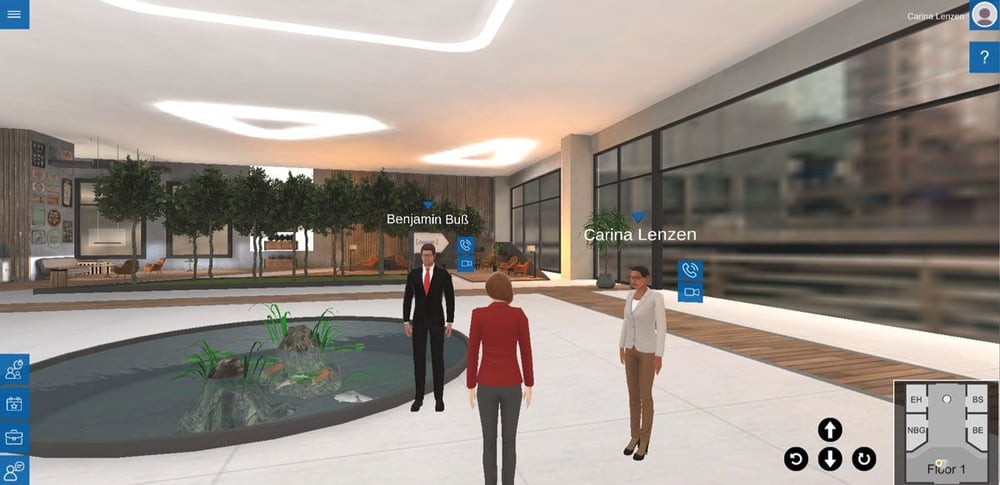Press material
You can find our logo and other press material here:
Presse release from 30.03.2022
The trade show industry seemed immune to digitization approaches for a long time. Then came the Corona pandemic and with it the need for interpersonal exchange in the virtual world. Long before that, WWM GmbH & Co. KG, a pioneer in the digitization of the event industry, had been dealing with this issue for a long time. In an interview with Wirtschaftsforum, its managing director Dr. Christian Coppeneur-Gülz talked about the transformation from physical to digital events and the next big revolution.
Wirtschaftsforum:Dr. Coppeneur-Gülz, your company has set out to facilitate encounters in the digital space in the form of virtual trade shows. Won't the most important component - direct personal contact - always fall by the wayside?
Dr. Christian Coppeneur-Gülz: A few years ago, I argued similarly, including in my book 'Event Resource Management with Digital Tools'. At that time, I also didn't see us being able to fully transport the multisensory feeling we experience in the real world into the digital space. Of course, there will always be certain limits to this, especially with regard to the physical experience - but if we consider the technological development and the great acceptance among broad consumer strata, this conviction must increasingly be questioned.

Wirtschaftsforum:Will the trade fair then eventually disappear in the real world once acceptance and technical performance are sufficiently high?
Dr. Christian Coppeneur-Gülz:We should not see this question as an either/or problem at all. Our current experience shows that after the pandemic there will be neither a return to purely face-to-face events nor a sole focus on digital events. Instead, the opportunities to meet and experience on-site will combine with the flexibility of time and place independence of the digital space. In other words, it is not a matter of completely replacing the physical world with the virtual one, but rather of supplementing it in a meaningful way with new digital opportunities that can be used to address the specific needs of customers and partners on an individual basis.
Wirtschaftsforum: How mature is the technology anyway to make the experience of a virtual trade show as enjoyable and seamless as possible?
Dr. Christian Coppeneur-Gülz:Rapid technical progress is the main reason why I have revised the basic conviction I mentioned at the beginning and see enormous potential for multisensory experience in digital space in the future. Let's take Microsoft Teams as an example - after all, everyone should have gained experience with this during the pandemic years. Three years ago, I wouldn't have thought that I could pick up so much of the facial expressions and the non-verbal level of my conversation partner during a video call as is actually the case today. However, early on in the corona pandemic, I realized that MS Teams is a fundamental improvement over some face-to-face meetings, where it's not uncommon for half of the participants to have a poor view of the whiteboard and all take handwritten notes in their respective meeting documents instead of having real-time access to a central document.
Wirtschaftsforum: Other technical revolutions - such as Oculus Rift or Google Glass - have not been able to meet the high expectations. Why should it be any different with digital trade shows?
Dr. Christian Coppeneur-Gülz: Technical progress does not proceed in a linear fashion. The topic of virtual reality in particular is a good example here: When the first better-known VR glasses came onto the market, they had to be connected to a powerful PC and the user was busy calibrating the device for the first half hour. Understandably, only the most enthusiastic audience stays tuned. The new generation of these glasses, on the other hand, have their own operating system, and the user can jump right in and explore their virtual world without having to do a lot of prep work. That will make a big difference in terms of broad impact.

Wirtschaftsforum: You have already identified the next big revolution: the metaverse.
Dr. Christian Coppeneur-Gülz: Today, customers can already engage with a brand not only two-dimensionally on a website, but in three-dimensional space, both in the context of individual consideration of the product and in interpersonal exchange. I think it's essential that companies start looking at the corporate metaverse now in order to be able to present their products, their culture and their people efficiently in the future. At the same time, this development gives us the opportunity to free ourselves to some extent from the limitations of the physical world. For example, we no longer have to think in terms of limited floor space when it comes to trade show booths; because "surface & space" are available in unlimited quantities in an immersive world. This realization clears the way for a whole new creative light-heartedness. Companies that have already recognized this will enjoy decisive competitive advantages; and anyone who does not offer their own corporate metaverse solution in five years' time will look like a company with no web presence at all today.
Source: https://www.wirtschaftsforum.de/interviews/wwm-gmbh-co-kg/im-metaverse-zur-immersiven-messe
René Meures
Head of Marketing & Sales
Tel.: +49 (0) 2472 - 9910 65
Email: marketing@wwm.de